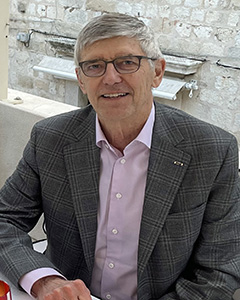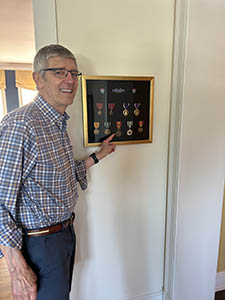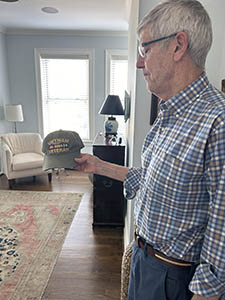Army Vietnam War Flight date: 08/28/24
By Joe Kolina, Honor Flight Chicago Veteran Interview Volunteer
Dr. Richard Lee was sure of one thing as he shipped out for Vietnam in May of 1969.
“I knew I was going to die,” he says with the calm, matter-of-fact assurance of a seasoned clinician accustomed to facing hard truths. “The life expectancy of a second lieutenant in the infantry in Vietnam was about six seconds.”
So sure was he that he decided to call off the wedding he and his fiancé, Jeanne, had planned. He even decided against taking an R-and-R (rest and recovery) trip to Hawaii to see her.
“I didn’t want to say goodbye twice,” he says.
Dr. Lee still lives with a physical reminder of that dark premonition. It’s 55 years later. He’s a youthful looking 79-years-old. We’re sitting in the white, airy living room of the elegant condo he shares with his wife Jeanne on North Lake Shore Drive in Chicago. I look out the windows and watch the Navy’s Blue Angels streaking across the sky with a deafening WHOOSH. It’s the city’s annual Air & Water show. Dr. Lee is dressed casually in a button-down shirt and shorts that reveal a legacy of combat. A white wrap and a black brace still hug his lower left leg all these decades later.
Why did Dr. Lee volunteer for duty he was convinced would kill him? What made a young college student from Tiffin, Ohio, enlist in the Army at the height of the Vietnam War when he qualified for a deferment? How did he summon the courage to earn two Bronze Stars, among other high honors, leading other boys in battle through jungles 8,000 miles from home?
Here’s what Richard Lee told me on that sunny, bright blue afternoon.
He was the second oldest child in a family of ten, the son of a small businessman. Young Dick grew up going to Catholic schools, including two years at a high school seminary. He worked two full-time jobs during summers to pay for pre-med at the University of Dayton. But in late 1967, his plan changed.
“I just thought where’s my life going?” he recalls. “Am I going to just be in a rut or do something for my country?”
And there was something else; actually, there was someone else.
“I remembered how proud I was of my father, how he served during World War Two, and what that meant to me as his child,” he says. “It just seemed like the right thing to do.”




Dick completed Basic Training and Advanced Infantry Training at Fort Dix, New Jersey, then “six months of hell” at Officer Candidate School at Fort Benning, Georgia. It was his father who helped him survive the hazing of a brutal instructor.
“I remember calling my dad and saying, you know, I’m just about up to here with this little punk,” he says. “And he said, you quit, he wins. And so I never did.”
That never-quit attitude would come in handy—a lot. Lt. Lee was soon leading reconnaissance patrols through the dangerous free fire zones in the legendary DMZ (de-militarized zone) that separated North and South Vietnam.
Helicopters dumped his platoon in the bush—literally, they jumped from the moving choppers to the ground below—and left them there for two weeks at a time. They walked for hours looking for evidence of North Vietnamese soldiers infiltrating the south. They planted mines along trails and called in air strikes to disrupt suspected enemy movements.
“It was hot, muggy, and crappy,” he says. “Hours of boredom in the sun interrupted by moments of sheer, dark terror.”
Ironically, Dick believes his fatalism about dying in combat actually helped him survive. He could respond quickly and act decisively when shooting started. After all, he thought, the odds are so bad, the idea of surviving so absurd, why worry?
Dick remembers a mission that illustrates the point. His team of six men was sent into North Vietnam to check out reports of an enemy battalion. Suddenly, they realized they were inside the North Vietnamese perimeter and surrounded.
“All of a sudden I hear AK-47 fire. Then, BRRRRRRR.” Dick raises his arms as if holding a rifle as he describes the ensuing firefight. “Well, I crawl up there and there’s about six men dead. One of them has a pistol with bullets. The sign of an important guy. We had just killed a general.”
He and his platoon gathered as much intelligence as they could and got out of there as fast as possible. He was awarded a medal for his actions.
Dick has other dramatic stories of life-threatening battles, and two Purple Hearts to prove it all. But that’s not what he emphasizes when he talks about his year at Alpha Four, an outpost so treacherously remote that he could see the North Vietnamese flag flying in the distant sky.
“My job in Vietnam was to get my men back alive,” he says. “They gave me some medals but I didn’t do anything extraordinary. I did my job. I just did what I had to do to get my men back alive.”
It was not an easy job. Dick still pauses, tears in his eyes, when he remembers a mission so dangerous that he only took 10 volunteers with him. A platoon was surrounded by a brigade of North Vietnamese soldiers. Eighty percent of the platoon was either dead or wounded. Dick heard about the situation on the radio and volunteered to go in and bring them out.
“I was right behind my point man,” Dick says, his voice faltering almost imperceptibly. “He said grenade. And I went to one side and he went to the other side.”
His point man died the next day of terrible injuries. Dick suffered serious wounds in his leg. But that wasn’t the end of the action for Dick. As the casualties from the endangered platoon were removed from the battlefield and taken to safety, his men were not coming back. Dick, a sergeant and four wounded men were the only ones left.
“One of the guys says to me: don’t leave us,” Dick says, recalling the soldier’s desperate, imploring tone. “And I said I’m not going to leave you. I’m not going to leave you.”
He sent the sergeant back for more help even as enemy soldiers approached.
“Well, I thought, I’m gonna die, so I might as well die big,” he says.
Dick stood up, started yelling and firing nonstop, despite his own injury, despite being outnumbered, despite the odds. Suddenly, when things seemed bleakest, the sergeant returned with help.
“We got them out of there,” he says. “And I think the reason they didn’t shoot me is because they thought I was crazy, you know, standing there, firing and yelling. And so we got those guys out.”
Dick was wounded twice during his tour in Vietnam. His thoughts naturally turned homeward. He remembers recuperating on a hospital ship in the Gulf of Tonkin when he got the chance to talk with Jeanne over a short-wave connection. Jeanne was at work, and reticent about talking with the ham operators listening.
“I told her, tell me you love me,” Dick remembers. “She says, uh-huh. So I said it again, Jeanne, tell me you love me. And she says uh-huh. Finally I hear the voice of one of the ham operators saying, for God’s sake, Jeanne, tell him you love him.”
She did love him. They got married and started a family as Dick went to dental school, and became an oral and maxillofacial surgeon. He practiced for 40 years in Findlay, Ohio before finishing his career as a professor of Oral and Maxillofacial Surgery at the medical school at the University of Illinois Chicago.
Dick didn’t talk much about his service when he returned to the States. He remembers getting in a cab in New Jersey when he was still wearing his uniform. The disapproving driver left him three blocks from his destination in a pouring rainstorm. Some students in dental school mocked him and referred to him as “The Captain.”
“You just got used to not talking about it,” Dick says.” What was the point? I didn’t need to defend myself.
His attitude has changed in recent years. He proudly wears a Vietnam Veterans cap. Four of the men he went to war with are among his closest friends. He allowed a colleague at UIC to submit the paperwork for the Honor Flight. Since his retirement he talks more about his experiences with family members. And he especially wants his grandchildren to learn about his story.
I ask him what he wants them to know. He could have cited the actions that led to two Bronze Stars for Valor, two Purple Hearts, the Army Commendation Medal, the Vietnamese Cross of Gallantry with Palm (its’ highest national honor), and the Vietnam Service and Vietnam Campaign medals.
But he doesn’t do that. This is what he tells me.
“I led my men, they did their job as they were supposed to, and I got most them back home alive,” he answers. “I’m proud of what I did. I’m glad I did it. And I’d do it again in a second.”
Honor Flight Chicago and its many friends and supporters say Thank You, Dick!


